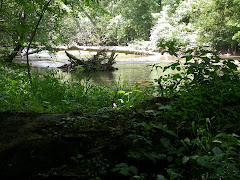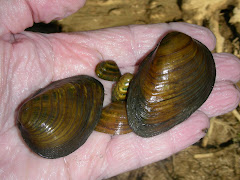
I've come across a second great map site (in addition to Google Earth, which I posted about earlier). This one is Microsoft's Live Search Maps (http://maps.live.com/). Like Google Earth, you can scroll around maps and switch to aerial photos. But unlike GE, Live Search has a "bird's eye" view, which puts you in a view that you'd see out of a very low flying plane. The resolution is much finer than Google Earth's, and you can practically count each branch on each tree. Pretty incredible.
I'm posting a picture from the same site along Darby as the Google Earth image a few posts back, the confluence area where Little Darby (on the left) flows into Big Darby in Battelle-Darby Metro Park. Unfortunately, I couldn't find a way to post the exact bird's eye image from Live Search, so I had to settle for this lower quality aerial shot. You'll just have to take my word for it that the detail on the site is incredible!
Of particular interest in this picture is the difference in water quality between Little Darby and Big Darby. Note that Big Darby is muddy after a rain, while Little Darby is relatively clear. This illustrates how Big Darby is under increased pollution pressure, largely due to increasing development in the eastern portion of the watershed.


